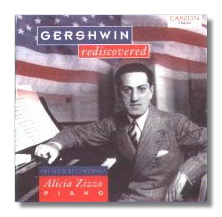
The Internet's Premier Classical Music Source
Related Links
- Gershwin Reviews
- Latest Reviews
- More Reviews
-
By Composer
-
Collections
DVD & Blu-ray
Books
Concert Reviews
Articles/Interviews
Software
Audio
Search Amazon
Recommended Links
Site News
 CD Review
CD Review
George Gershwin Rediscovered

The Gershwin Manuscripts
- Prélude #1 in B Flat Major (Prélude I)
- Prélude #2
- Prélude #3, "Rubato"
- Prélude #5, "Novelette in Fourths"
- Prélude #4, (Prélude II)
- Prélude #6, (Prélude III)
- Prélude #7
- Blue Monday, Piano Suite
- 7 Miniatures
- Rhapsody in Blue, for piano solo
Alice Zizzo, piano
Carlton Classics 30336 56:18
Summary for the Busy Executive: Gershwin without the chicken fat.
I've got a backlog of about two years' worth of CDs for review. Occasionally, it happens that by the time I get around to writing, the CD has disappeared. Normally, I simply scrap the idea of writing, since it makes very little sense to whet an appetite or to rain on a parade when few will likely have the chance to hear the album in question. I've contradicted my habit at the request of a member off-list and because I think the album raises several interesting points. This is an album and Alice Zizzo a name to watch for.
For the past two decades or so, Gershwin has begun to penetrate the province of scholars. It may seem incredible that a composer so popular has never really been heard, but this is indeed the case. In almost every instance, we do not hear his concert pieces as the composer wrote them. The orchestrations, even the ones not by Grofé or Bennett, have usually been silently "emended." It took roughly fifty years for Porgy and Bess to be heard as the composer had originally conceived it. As far as I know, Gerard Schwarz was the first to perform the original version of An American in Paris, and this around 1990, over sixty years after its première. If Gershwin has failed, he has had lots of help doing so. I find many analogies to the case of Bruckner. The battle for Bruckner began to be won when scholars provided editions which aimed to rescue Bruckner from his early editors. Today, this happens on a more modest scale with Gershwin. It amazes me that so much original material remains.
Of course, aesthetically the source as source means very little. It might very well happen that Gershwin's "silent helpers" actually improved the original. After all, in many cases, the "helpers" were musicians of talent and taste themselves. It just hasn't turned out that way with Bruckner, and so far it hasn't turned out that way with Gershwin, either. In almost every instance, what Gershwin actually wrote comes across as more pungent, more incisive, and more interesting than what's usually presented. Recently, Warner Brothers published the facsimile manuscripts of both Cuban Overture and Concerto in F. Tommy Krasker's restorations of the Broadway shows I think have shaken up the bromides of American theatre history. Alice Zizzo has done the same for the piano music.
Gershwin wrote a lot of piano music and published very little. Ira, I believe, saved almost every scrap of paper he and his brother wrote on and donated it all to the Library of Congress. Thanks to Ira, we know that George wrote out full piano accompaniments to most of his songs - accompaniments that don't necessarily agree with the sheet music. I'd love to hear these. Gershwin also wrote sketches and filled tune books. Thanks to Alice Zizzo, I know now that Gershwin wrote seven Préludes (not five), only three of which he published. I happen to believe he published the best three, but that doesn't diminish the interest of the other four. One also finds chips - mostly two-minute ideas that Gershwin never got to elaborate. The main work on the CD, as far as I'm concerned, is Zizzo's reconstruction of Gershwin's own solo piano version of Rhapsody in Blue. It differs significantly from Grofé's two versions and probably lies pretty close to the manuscript Gershwin gave the Whiteman orchestrator. One hears the structural steel in Gershwin's original thought. Grofé undoubtedly did a splendid job, but the primary impact of the piece goes back to Gershwin himself. One also finds some improvisational passages that Grofé - quite rightly, in my opinion - left out of or changed (with Gershwin's input?) in the published score.
I find it interesting to compare contemporary pianists' playing to the composer's, since we do have recordings of the source - piano rolls, radio recordings, private acetates. Although it's hard to generalize Gershwin's interpretations, since he rarely played things the same way twice, I'd characterize his playing as rhythmically electric, elegant, and even non-sentimental. Zizzo doesn't throw off the same rhythmic sparks. Her line runs more smoothly, with a greater shaping of phrase through dynamics. At times she can get downright soupy, mired in rubato. I prefer Gershwin (and Levant). If you want exciting Gershwin playing, try Bernstein or Fiedler, even if they do use the wrong scores. But she does give you the essence of Gershwin's musical thinking. For that, I'm incredibly grateful.
Copyright © 2001, Steve Schwartz

















